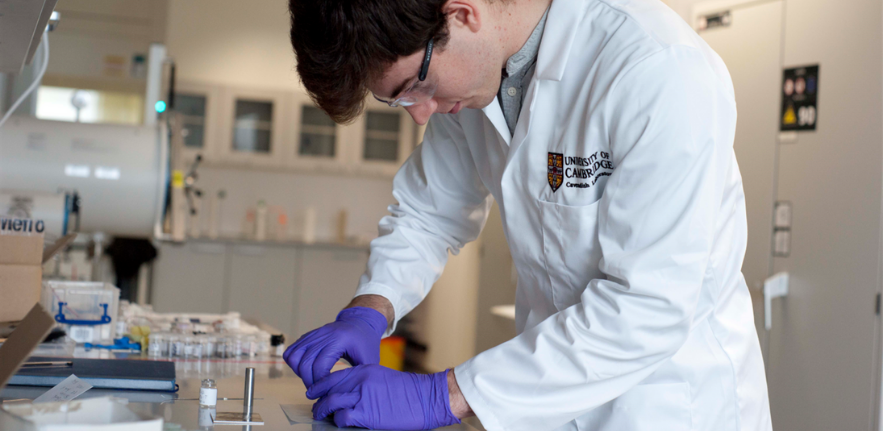
Apprenticeships at the Cavendish
The Cavendish Laboratory and the University of Cambridge offer exciting opportunities for new and current members of staff to develop their careers and gain a nationally recognised qualification.
We are committed to nurturing talent and developing expertise through providing relevant vocational and professional apprenticeships across the department. Apprentices of all ages, in a variety of roles, can benefit from tailored learning and develop their professional skills, whilst helping to meet the current and future needs of the University.
Current opportunities
Science apprenticeships
The Department currently runs two apprenticeships within the science discipline: a level 3 Laboratory Technician and a level 6 Technician Scientist.
- The level 3 apprenticeship is for those who have no experience of working in a laboratory but would like to start. This apprenticeship course gives the apprentice the necessary knowledge and skills to carry out both routine and one-off laboratory testing (and manufacturing where relevant) and perform a variety of technical support functions across the Department.
- The level 6 course develops skills further so the technician can carry out established laboratory-based investigations and scientific experimentation using bench and instrumentation techniques. A technician scientist will apply a range of skills and follow well-established principles. They carry out routine lines of enquiry, development, or investigation. They collect scientific information and analyse, interpret, and evaluate data. They prepare results and provide progress updates on their work.
By undertaking an apprenticeship with the Laboratory Technician team, you will learn how best to support and assist research.
Mechanical Engineering apprenticeships
The Cavendish Technical Services offer a Level 3 Mechanical Engineering qualification apprenticeship:
- Our apprentices start in the student workshop to develop the foundation to become a machinist. Here you will learn hand fitting, manual machining, basic materials, and CAD/CAM knowledge. You will also be introduced to the CNCs.
- Cad Cam Training on fusion 360 is provided to develop your design skills and offline programming
- Once ready you will move into the main workshop to carry out CNC Training on lathes, Mills and EDM machines
- As an integral part of the Cavendish Technical Services, you will be exposed to a wide variety of jobs and materials making this a great place to learn and gain the skills you need.
Please feel free to contact us if you would like to know more.
Case studies
What better way to hear about why you should consider an apprenticeship and learn about how apprentices are getting on than hearing directly from our apprentices themselves.
| Meet Dylan | Meet Oliwia | Meet Tom | Meet Scott | Meet Stephen |
Future apprentices
Whether you are thinking about what to do after you leave school or you are already in work at the University and thinking about gaining new skills in your current role or role change, an apprenticeship could be the right path for you. If you are 16 years or older and would like a job that offers training, then an apprenticeship is an opportunity to earn while you learn.
-
Who can apply?
Anyone living in England*, over-16 and not in full time education & existing staff can apply
-
How long does an apprenticeship last?
Depending on the skills and levels required, an apprenticeship can last from one to four years
-
What level of qualifications are included?
You can now start an apprenticeship at flexible entry levels e.g. from GCSE and A Level all the way up to Masters level
-
What’s in it for me?
Apprenticeships combine practical training in a job with study and cover a wide choice of careers. They are a great way to apply your learning immediately to your work whilst getting paid. The training can give you the skills you need to start your career, or boost your skills if you are already in work. You can also use apprenticeships to develop leadership and management expertise.
As an apprentice you’ll:
- work alongside experienced staff
- gain job-specific skills
- earn a wage and get holiday pay
- get time for study and training related to your role (amounting to approximately one day a week)
*Residency requirements:
- You must have the right to work in England.
- You must be either:
- a citizen of a country within the European Economic Area (EEA) (including other countries determined within the EEA or those with bilateral agreements), or have the right of abode in the UK, and have been ordinarily resident in the EEA (including other countries determined within the EEA or those with bilateral agreements), for at least the previous three years on the first day of learning
- or a non-EEA citizen with permission from the UK government to live in the UK, (not for educational purposes) and have been ordinarily resident in the UK for at least the previous three years before the start of learning.


